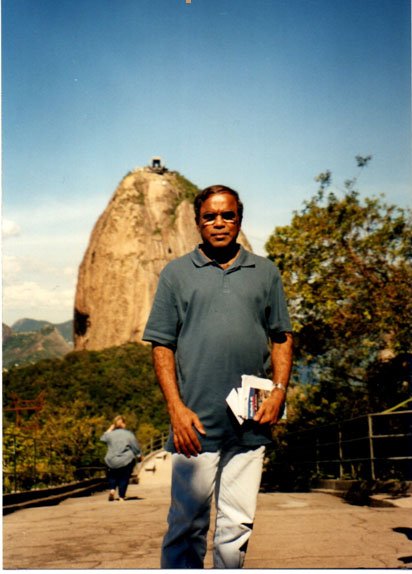America
Brahma and Laxmi reincarnate in Brazil? (Travel with M.P. Prabhakaran)
By
M.P. Prabhakaran
(This is Chapter 3 from Mr. Prabhakaran’s book, An Indian Goes Around the World – I: Capitalism Comes to Mao’s Mausoleum, which we started serializing recently.
See links for the first two chapters below.
Chapter 4, “How Portugal Failed to Colonize Calicut: Chat with a Brazilian,†will appear as the next installment. Read every Monday. – Editor)
Even as a teenager living in India I used to fantasize about visiting Rio de Janeiro. Years later, when I moved to New York, the fantasy got rekindled. It happened when I heard the late Australian singer Peter Allen’s famous song, “When my baby flies with me I go to Rio de Janeiro….†At long last, in November 2001, I was able to live that fantasy – of course, with no baby flying with me.
I landed in Rio de Janeiro on a hot and humid evening. It being late spring in that part of the world, I was not expecting that kind of weather. I am not complaining, just making a statement. A person born and brought up in the Indian state of Kerala shouldn’t be complaining about the hot and humid weather anywhere in the world. Moreover, when the beauty of the world-famous Copacabana Beach beckons, complaining about the weather is the last thing one would want to do. Copacabana was just two blocks away from the hotel I checked into.
Though tired, sitting inside the hotel room and idling away the evening, when tourists from all over the world were reveling on the beach a few yards away, was not something I would consider even for a minute. I went out.
The streets were crowded. People looked jolly and happy. The light rain that had been falling for some time failed to keep them indoors. Nor did it dampen their spirits. Most of them were either on their way to the beach or returning from it. Some of the women were fresh from their swim, still in their two-piece swimwear. The rain made the contours of the parts of their body, which the two pieces were supposed to hide, very pronounced. The spectacle was quite an eyeful.
Strolling on Copacabana Beach
In a few minutes, I was on Copacabana Beach. I walked on the beach as long as my tired feet could drag me, watching swimmers, sunbathers and those frolicking around. I also threw an occasional glance at young couples rolling on the sand and making love.
Copacabana extends to Ipanema in a curve. A small piece of land jutting out into the sea separates the two beaches. The body of water in the curve forms a small bay. When Portuguese explorers spotted the bay on January 1, 1502, they mistook it for the mouth of a river. Because it happened in the month of January, they called it Rio de Janeiro, meaning the River of January.
The city that was built around the bay later also took the same name. In time, Rio de Janeiro became the capital of Brazil. It remained so until 1960, the year in which the capital was moved to the newly-built Brasilia. But Rio de Janeiro continued to be the cultural capital of the country. It has enjoyed that status to this day.
By the time I reached Ipanema, I was completely exhausted. I sat on a bench and started musing. When it became dark and the beach started wearing a deserted look, I headed for another part of the city.
On the way, I walked into a convenience store to pick up a bottle of water. The store owner didn’t speak a word of English. But I could see that he was anxious to say something to me. And I knew that it had nothing to do with the price of the bottled water I had just picked up. By the time I paid it, he found a way of getting over the language barrier. “Mahatma Gandhi, Indira Gandhi,†he said and gave me a handshake.
But for my ignorance of the Portuguese language, I would have convinced him that the latter, though she shared a surname with the former, was a disgrace to him. Through gestures and a “yes†I let him know that he correctly identified my ethnicity. I knew that was what he meant by invoking those two well-known Indian names.
My next stop was at a restaurant. I was happy to see that the food there was served buffet-style and paid for by weight. I could pick what I saw and be sure of what I was eating. No waitress would have to punish herself trying to figure out what I was ordering. (I saw only waitresses around, no waiter.)
Ravi Shankar and Kama Sutra
I had just started enjoying the food and the ambience, when I saw a couple sitting at two tables away staring at me – in an admiring sort of way – and saying something. I smiled at them and they smiled back. After a few more minutes of staring and smiling, the man came up to me and handed a napkin on which he had written: “Ravi Shankar, very good.†I nodded in agreement. That the Indian sitar maestro was popular even among ordinary South Americans made me very happy.
He sat by my side and, soon, his partner also joined us. Both appeared to be in their twenties, and both spoke a few words of English. But the expressions on their faces conveyed more than words did. They conveyed, or I thought they did, that they admired India and things Indian very much. We spent a happy one hour together – with laughs, gestures and signs making up for our language shortcomings. When I was about to leave, the man said, “Kama Sutra, good.†That made his girlfriend burst into a loud laugh, inviting the attention of those sitting at nearby tables.
How did I know that she was his girlfriend? Soon after they had come and sat at my table, the man had introduced her to me as his wife. She immediately corrected him: “No, girlfriend.â€
Maybe there was a message in it for me. But I was too tired to hang around and explore. Moreover, I was booked to go on a conducted tour of the city the next morning.
â—
I was on my way to the Sugar Loaf Mountain, a great tourist attraction in Rio de Janeiro. As the tour bus passed by a row of shops, a signboard in front of one of them caught my attention. It had the word Laxmi on it, written in bold letters.
Laxmi, in Hindu mythology, is the goddess of wealth. A shop in a Brazilian city named after a Hindu goddess? “Could it be a store selling antiques from India?†“Is it an outlet for some import-export business dealing in Indian goods?†“Is it the office of a company owned by an Indian?†Thoughts like these crossed my mind in rapid succession.
I also thought about other possibilities, like: “Is it a makeshift temple where local Hindus worship?†That seemed remote. The only Indian I had met until then was not a Hindu. He was a Catholic from Goa, living in New York. He had come to Rio de Janeiro to fight a court battle to gain custody of his five-year-old daughter from his estranged Brazilian wife. They had met and married in New York. She left New York and relocated to her native Rio, taking their only child with her, when he was away in India on a business trip. According to him, she was abusive and alcoholic. He didn’t want his daughter to be raised by her.
My next thought was: “Could it be a store doubling as a temple now and then?†I had heard about a garage in New York doubling as a church on Sundays. Some newly-arrived Indian immigrants belonging to an out-of-the-mainstream Christian denomination decided that they would feel comfortable only if they congregated separately and communicated with God in their native language, in this case Malayalam. Until they raised enough money to build their own church, they decided to conduct the Sunday mass in a garage. They knew God wouldn’t have any problem with that. Wasn’t Jesus born in a manger?
The debate in my mind over the word Laxmi on the signboard ended when our bus stopped in front of a cable car. “The cable car will take you to the top of Sugar Loaf,†the tour guide announced.
The tour ended in the evening and the tour bus brought me back to my hotel. The “Laxmi†on the signboard continued to intrigue me all night. To satisfy my curiosity, I returned to the place the next morning. I learned to my utter disappointment that it had nothing to do with goddess Laxmi. Nor had it anything to do with Hinduism, India or Indians. The place was a barbershop. How did a barbershop in Brazil get a Hindu goddess’s name? I went in to find out.
There were three employees there, and not a single customer. They were sitting on the swivel chairs meant for customers. Two of them were talking with each other and the third one was half asleep. As I walked in, their faces lit up. Maybe they thought that they got the first customer of the day. There was no reason why they should think otherwise. How often does a person walk into a barbershop with a spiritual question?
The three barbers, like many Brazilians I met, could pass for my compatriots. So I asked them whether they were from India. They spoke a little English, adequate enough to understand my question. They were not from India.
How did their shop get the name Laxmi? They didn’t know. Only their boss would know, they said. And the boss was not in town that day. He had gone to Sao Paulo to visit his family. I came out disappointed. But I did pray as I came out: “May Laxmi, the goddess of wealth, shower her blessings on this place!†It badly needed Laxmi’s blessings.
The Seeker of Universal Truth
Two days later, I had a similar experience – the experience of being elated first, at the sight of a Hindu holy name in the unlikeliest of places, only to be disappointed later. It happened on Rua Baratas Ribeiro, a busy street near my hotel. I was on a stroll, walking aimlessly, without paying attention to anything. Suddenly, when I saw the word Brahma staring at me from a faraway billboard, it aroused my curiosity.
Brahma, along with the other two of the sacred triad, enjoys an exalted position in the Hindu pantheon. The other two are Vishnu and Shiva. To the believers among Hindus, Brahma is the Creator, Vishnu the Preserver and Shiva the Destroyer. “What is Brahma doing in Brazil?†I asked myself and walked fast towards the billboard. As I came closer, it became clear that this Brahma had nothing to do with the one the Hindus worship. The billboard was a beer advertisement. The Hindu in me felt let down. Again.
I didn’t allow that to bother me for too long, though. It was another hot and humid evening in Rio and I was feeling very thirsty. I walked into a nearby bar and asked the waitress what the most popular Brazilian beer was.
“Brahma,†she said, without a moment’s pause.
“Fill it to the rim,†I said, borrowing the words from a popular 1970s’ coffee advertisement in the U.S.
The gusto with which I said it attracted the attention of a couple sitting at the next table. “You seem to be so excited,†the man said. “Do you want to tell us what it’s about?â€
“With pleasure,†I told them. “You see, Mahatma Gandhi once said that before a hungry man, God should appear in the form of bread. Before this thirsty Hindu, God has appeared in the form of beer. I am blessed!â€
Pointing to the word Brahma on the bottle, I gave them a brief talk on Hinduism. The talk, as I realized later, was unnecessary in the case of this couple. They had just finished their master’s degree in philosophy at the University of London. They met at the university and fell in love. Both had taken a couple of courses in Hinduism. “But Brahma reincarnating in the form of beer? That adds a whole new chapter to Hindu mythology,†the man said.
“Congratulations on your invaluable contribution,†his girlfriend added.
“Three cheers for Brahma!†I said, raising my glass. They laughed.
As I was getting ready to leave, they thanked me for the “interesting evening.â€
“The beauty of being a Hindu,†I told
them, “is that you are at liberty to laugh at, and with, all the gods and
goddesses in your religion. You can even reject them all and still be a Hindu.
The Universal Truth you are seeking has no gender or form.â€
Photo: 1:
The author waiting for the cable car, which is the only transportation available to the top of the Sugar Loaf Mountain (seen in the background), one of the biggest tourist attractions in Rio de Janeiro, Brazil.
Photos: 2
Ipanema (above) and Copacabana (seen beyond the bay-like body of water, in front of rows of luxury hotels and residential buildings). The two beaches are separated by a small piece of elevated land jutting out into the sea.
(To be
continued)
(M.P. Prabhakaran can be reached at prabha@eastwestinquirer.com)
2) Eva Peron’s tomb is too small for her ego (Travel with M.P. Prabhakaran)
1) My Two Embarrassing Moments in Buenos Aires (Capitalism Comes to Mao’s Mausoleum-1: M. P. Prabhakaran)
http://dlatimes.com/article.php?id=40709
(about the author) An Indian Goes Around the World – I (Capitalism Comes to Mao’s Mausoleum)http://dlatimes.com/article.php?id=40126


























